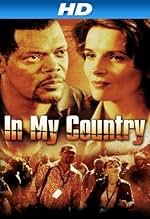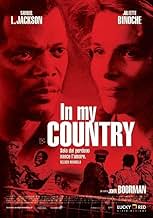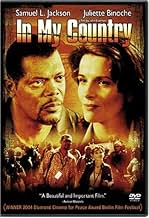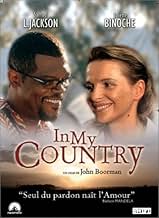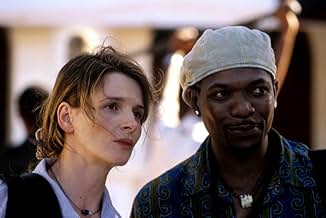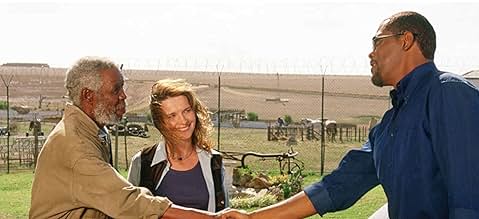IMDb-BEWERTUNG
6,0/10
3016
IHRE BEWERTUNG
Füge eine Handlung in deiner Sprache hinzuA journalist and a poetess meet during the hearings of South African Truth and Reconciliation Commission.A journalist and a poetess meet during the hearings of South African Truth and Reconciliation Commission.A journalist and a poetess meet during the hearings of South African Truth and Reconciliation Commission.
- Regie
- Drehbuch
- Hauptbesetzung
- Auszeichnungen
- 1 Gewinn & 3 Nominierungen insgesamt
Menzi Ngubane
- Dumi Mkhalipi
- (as Menzi 'Ngubs' Ngubane)
Harriet Lenabe
- Albertina Sobandla
- (as Harriet Manamela)
Dan Robbertse
- Sgt. de Smidt
- (as Daniel Robbertse)
Empfohlene Bewertungen
John Boorman, an interesting film maker, takes us to South Africa after Apartheid. Right after the country underwent the big change during the last decade of the last century, a commission was formed in order to hear the atrocities that were committed by the old regime, as the victims, and their families, were invited to come forward and speak to the panel that was investigating. The film is based on a novel by Antjie Krog, but not having read it, one can't really give an opinion about how true the film is to the novel.
"In my Country", the movie based on this book in its American release, came and went quickly. We tried to see it during its debut, bu it disappeared from local screens in no time. We recently caught the movie on cable.
There are some interesting aspects of what the commission was trying to accomplish in trying to bring members of the repressive force to justice. As in other conflicts, the people that were involved in the atrocities keep repeating about how they were following orders, a poor excuse, since no one owned up to having done anything wrong. After all, this was a country in which a white minority controlled a big black majority, and who wanted to keep things unchanged.
At the center of the story is Anna Malan, a white South African, who is a radio personality. She follows the commission as more and more people are coming forward to tell their stories. A Washington Post black reporter, Langston Whitfield, is also covering the process. Inevitably, both come together. While they clash at first, they find common ground in their desire to tell the truth about South Africa.
Juliette Binoche and Samuel L. Jackson are seen as Anna and Langston. Both give good performances. Brendan Gleeson is seen as the evil De Jager, a man responsible for some of the crimes committed against the poor black of the country who were deemed terrorist by the controlling whites. Menzi Ngubone plays Dumi, Anna's assistant and Sam Ngakone makes a dignified appearance as Anderson, who works for Anna's family.
The film is interesting to watch as Mr. Boorman has given us a film to think about the criminal acts that were committed by a group of people that didn't stop to consider the consequences of what they were doing.
"In my Country", the movie based on this book in its American release, came and went quickly. We tried to see it during its debut, bu it disappeared from local screens in no time. We recently caught the movie on cable.
There are some interesting aspects of what the commission was trying to accomplish in trying to bring members of the repressive force to justice. As in other conflicts, the people that were involved in the atrocities keep repeating about how they were following orders, a poor excuse, since no one owned up to having done anything wrong. After all, this was a country in which a white minority controlled a big black majority, and who wanted to keep things unchanged.
At the center of the story is Anna Malan, a white South African, who is a radio personality. She follows the commission as more and more people are coming forward to tell their stories. A Washington Post black reporter, Langston Whitfield, is also covering the process. Inevitably, both come together. While they clash at first, they find common ground in their desire to tell the truth about South Africa.
Juliette Binoche and Samuel L. Jackson are seen as Anna and Langston. Both give good performances. Brendan Gleeson is seen as the evil De Jager, a man responsible for some of the crimes committed against the poor black of the country who were deemed terrorist by the controlling whites. Menzi Ngubone plays Dumi, Anna's assistant and Sam Ngakone makes a dignified appearance as Anderson, who works for Anna's family.
The film is interesting to watch as Mr. Boorman has given us a film to think about the criminal acts that were committed by a group of people that didn't stop to consider the consequences of what they were doing.
COUNTRY OF MY SKULL aka IN MY COUNTRY is no masterpiece thats for sure, but it has been unfairly slaughtered by critics who were expecting something else entirely.
The film is set against the real life "Truth and Reconcilliation Commission" set up in South Africa after apartheid in order to begin the process of healing the wounds of a divided nation.
However this commission is not the subject of the film, it is the setting. The main drama of the film emanates from the love/hate relationship between journalists Langston Whitfield (Samuel L.Jackson) and Anna Malan (Juliette Binoche).
Whitfield, a Washington Post journalist, is sent to South Africa to cover the hearings. He meets local journalist Anna Malan who is covering the hearings for radio. She trusts the commission entirely and believes forgiveness is the only way forward for her country.
Whitfield however places no trust in a system that does not punish. The pair immediately clash and begin a battle of wills.
however soon the enormity of the evidence they hear draws them together into an affair.
Boorman is not interested in exploring the TRC as a system or it's successes and failures. Instead he is more interested in its impact on his two vastly different protagonists, who must confront issues of race and gender in their own relationship as much as in their work. This is the films strength and weakness. It is beautifully intimate yet is set in a time of great social upheaval which is all but ignored.
The other major problem is that much of the early dialogue sets out to explain the political and social setting rather than define the characters. This leads to somewhat inane characterisation.
With Binoche however Boorman has struck it lucky. Her hard work is evident and although her character is poorly drawn the actresses understanding of emotion allows us to read much into her performance. Even her Afrikaans accent is passable. She displays an incredible tenderness throughout the film. Jackson however does not fair as well, giving a sullen and almost lethargic performance.
To call COUNTRY OF MY SKULL an utter failure as has been suggested by some critics is unfair. With his female protagonist and interesting setting Boorman's sincerity is beyond question and for that alone he deserves praise.
The film is set against the real life "Truth and Reconcilliation Commission" set up in South Africa after apartheid in order to begin the process of healing the wounds of a divided nation.
However this commission is not the subject of the film, it is the setting. The main drama of the film emanates from the love/hate relationship between journalists Langston Whitfield (Samuel L.Jackson) and Anna Malan (Juliette Binoche).
Whitfield, a Washington Post journalist, is sent to South Africa to cover the hearings. He meets local journalist Anna Malan who is covering the hearings for radio. She trusts the commission entirely and believes forgiveness is the only way forward for her country.
Whitfield however places no trust in a system that does not punish. The pair immediately clash and begin a battle of wills.
however soon the enormity of the evidence they hear draws them together into an affair.
Boorman is not interested in exploring the TRC as a system or it's successes and failures. Instead he is more interested in its impact on his two vastly different protagonists, who must confront issues of race and gender in their own relationship as much as in their work. This is the films strength and weakness. It is beautifully intimate yet is set in a time of great social upheaval which is all but ignored.
The other major problem is that much of the early dialogue sets out to explain the political and social setting rather than define the characters. This leads to somewhat inane characterisation.
With Binoche however Boorman has struck it lucky. Her hard work is evident and although her character is poorly drawn the actresses understanding of emotion allows us to read much into her performance. Even her Afrikaans accent is passable. She displays an incredible tenderness throughout the film. Jackson however does not fair as well, giving a sullen and almost lethargic performance.
To call COUNTRY OF MY SKULL an utter failure as has been suggested by some critics is unfair. With his female protagonist and interesting setting Boorman's sincerity is beyond question and for that alone he deserves praise.
Director John Boorman has taken on a weighty and incendiary subject, much like Terry George's recent take on genocide in "Hotel Rwanda." Although "In My Country" is set post-Apartheid, it still covers a hot topic: what do you do with the people that are to blame when a genocide occurs? President Nelson Mandela formed a commission to get at the truth and in return for that information he was offering amnesty for those government officers that were only 'following orders'. An amazing precedent to say the least.
However, director Boorman has chosen to balance the emotional testimony of the victims with a sometimes humorous side-story involving an American journalist, played by the great Samuel L. Jackson ("Coach Carter") and a local 'white' radio reporter, played by the equally great Juliette Binoche ("The English Patient").
Certainly, a story of this import deserves a documentary but as it stands, this is as close as any American will ever get to this story since many newspapers buried it when it originally occurred. Racism is an ugly thing, but forgiveness is a beautiful thing and this movie balances the two in an effective and entertaining manner.
Check this one out, especially if you are a fan of "Hotel Rwanda" and hearing the 'truth' for a change.
However, director Boorman has chosen to balance the emotional testimony of the victims with a sometimes humorous side-story involving an American journalist, played by the great Samuel L. Jackson ("Coach Carter") and a local 'white' radio reporter, played by the equally great Juliette Binoche ("The English Patient").
Certainly, a story of this import deserves a documentary but as it stands, this is as close as any American will ever get to this story since many newspapers buried it when it originally occurred. Racism is an ugly thing, but forgiveness is a beautiful thing and this movie balances the two in an effective and entertaining manner.
Check this one out, especially if you are a fan of "Hotel Rwanda" and hearing the 'truth' for a change.
A black journalist of Washington Post, Langton Whitfield; is sent by provocation by his boss to South Africa in order to "cover" the auditions of proceedings named Truth and Reconciliation Commission, that must decide if murders and torture authors can be amnestied if they say truth on act that they have made and express regrets in face of their victims. Langston encounters a young Afrikaner woman who follows also for South African radio the same sessions. She discovers the horror of Apartheid politics and she is bowled over by these facts. In these circumstances, Langston and Anna bring closer together. It is the story of the deep of human cruelty and also of the power of love and forgetting. The movie is dramatic and well played by Samuel L. Jackson and Juliette Binoche, but seems to be a little too oriented and melodramatic.
I am not a big fan of romances, but in this case I gave it a try because of director John Boorman ["Excalibur," "The Emerald Forest," "Hope & Glory, "Deliverance"] and actors Samuel L. Jackson ["Coach Carter," "Star Wars: Episodes 2 & 3," "The Red Violin"] and Juliette Binoche ["Chocolat," "The English Patient," and the 1992 remake of "Wuthering Heights"].
This film was in the better half of Boorman's, while Jackson and Binoche gave top-notch performances. The supporting role of Dumi, played by Menzi Ngubane was excellent, as he acted both as foil and antagonist between the couple.
I think the weakest elements of this film are in screenwriter Ann Peacock's dialogue and in the construction of the Anna Malan and brother Boetie characters. The first for taking on just a little too much burden of responsibility, especially in one somewhat uncharacteristic scene at one of the hearings with a particularly gory testimony, and the latter for being incomplete when a key development occurs that should have played more into the storyline and into Anna's reactions.
From what I've heard about the book by Antje Krog, I can understand why anyone who had read it before seeing this movie might be disappointed, but it was certainly clear to me by the marketing that this was a romance and not a cinematic litany of the horrors of Apartheid.
Given the turbulent background of Apartheid and the South African Truth & Reconciliation Commission proceedings, along with other clues, I was also expecting this to be an adversaries-fall-in-love story, which is the type of romance that I like the most. The collective incidents which drive Anna and Langston together are neither contrived or turgid, and fall comfortably in between, especially because they are juxtaposed with events based in reality. There is one most significant turn at one of the hearings, which, given it is true, would bring any two adversaries together, in peace if not in love.
I don't want to give away anything about the extent of their romance, except to say that how it ended up was a pleasant surprise and quite satisfactory. I wish I could recommend two other good romances that end so similarly and satisfactorily, but I would give away the surprise.
This film is certainly worth a rental or two, worth showing to friends, but I suppose the disturbing nature of the background events might keep some people from buying it for their home library, but if you bought a copy of "American History X," I think you might want to buy this one.
This film was in the better half of Boorman's, while Jackson and Binoche gave top-notch performances. The supporting role of Dumi, played by Menzi Ngubane was excellent, as he acted both as foil and antagonist between the couple.
I think the weakest elements of this film are in screenwriter Ann Peacock's dialogue and in the construction of the Anna Malan and brother Boetie characters. The first for taking on just a little too much burden of responsibility, especially in one somewhat uncharacteristic scene at one of the hearings with a particularly gory testimony, and the latter for being incomplete when a key development occurs that should have played more into the storyline and into Anna's reactions.
From what I've heard about the book by Antje Krog, I can understand why anyone who had read it before seeing this movie might be disappointed, but it was certainly clear to me by the marketing that this was a romance and not a cinematic litany of the horrors of Apartheid.
Given the turbulent background of Apartheid and the South African Truth & Reconciliation Commission proceedings, along with other clues, I was also expecting this to be an adversaries-fall-in-love story, which is the type of romance that I like the most. The collective incidents which drive Anna and Langston together are neither contrived or turgid, and fall comfortably in between, especially because they are juxtaposed with events based in reality. There is one most significant turn at one of the hearings, which, given it is true, would bring any two adversaries together, in peace if not in love.
I don't want to give away anything about the extent of their romance, except to say that how it ended up was a pleasant surprise and quite satisfactory. I wish I could recommend two other good romances that end so similarly and satisfactorily, but I would give away the surprise.
This film is certainly worth a rental or two, worth showing to friends, but I suppose the disturbing nature of the background events might keep some people from buying it for their home library, but if you bought a copy of "American History X," I think you might want to buy this one.
Wusstest du schon
- WissenswertesAfter seeing this film Nelson Mandela called it, "a beautiful and important film about South Africa's Truth and Reconciliation Commission. It will engage and influence not only South Africans, but people all over the world concerned with the great questions of human reconciliation, forgiveness, and tolerance."
- PatzerAll number plates on vehicles throughout the film (apart from archival footage) are fake and do not follow the format of older South African number plates.
- Zitate
Anna Malan: [last lines - voiceover] Because of you, this land no longer lies between us but within. It breathes becalmed, after being wounded in its wondrous throat. In the cradle of my skulll it sings, it ignites my tongue. Five thousand stories are scorched on your skin. I am changed forever.. I want to say, forgive me, forgive me, forgive me.
- VerbindungenEdited into In My Country: Deleted Scenes (2005)
- SoundtracksSenzenina
Arranged by Murray Anderson & Warrick Swinney
Performed by Princess Soi-Soi Gqeza, Mxolisi Mayekane, Mandia Lande, Michael Ludonga, Simpiwe Matole & The New Teenage Gospel Choir
Published by Hi-Z Sound
Top-Auswahl
Melde dich zum Bewerten an und greife auf die Watchlist für personalisierte Empfehlungen zu.
- How long is In My Country?Powered by Alexa
Details
- Erscheinungsdatum
- Herkunftsländer
- Offizielle Standorte
- Sprachen
- Auch bekannt als
- Country of My Skull
- Drehorte
- Produktionsfirmen
- Weitere beteiligte Unternehmen bei IMDbPro anzeigen
Box Office
- Budget
- 12.000.000 $ (geschätzt)
- Bruttoertrag in den USA und Kanada
- 163.893 $
- Eröffnungswochenende in den USA und in Kanada
- 22.383 $
- 13. März 2005
- Weltweiter Bruttoertrag
- 1.491.434 $
- Laufzeit1 Stunde 45 Minuten
- Farbe
- Sound-Mix
- Seitenverhältnis
- 1.85 : 1
Zu dieser Seite beitragen
Bearbeitung vorschlagen oder fehlenden Inhalt hinzufügen



